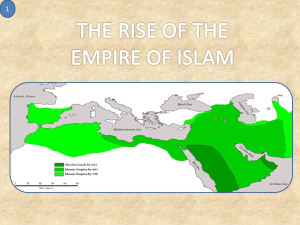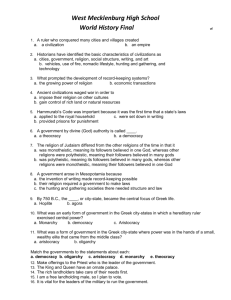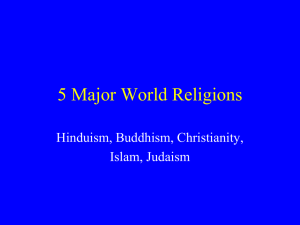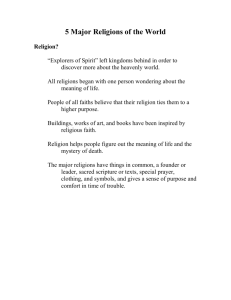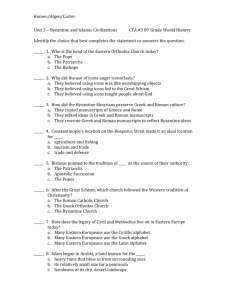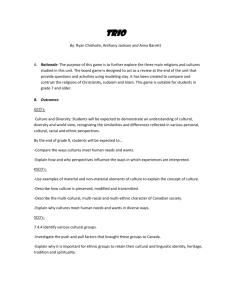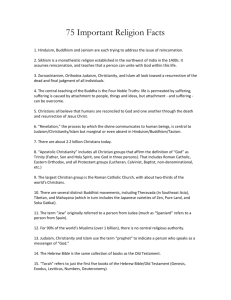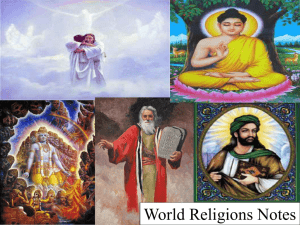CH 3 World Religions
advertisement
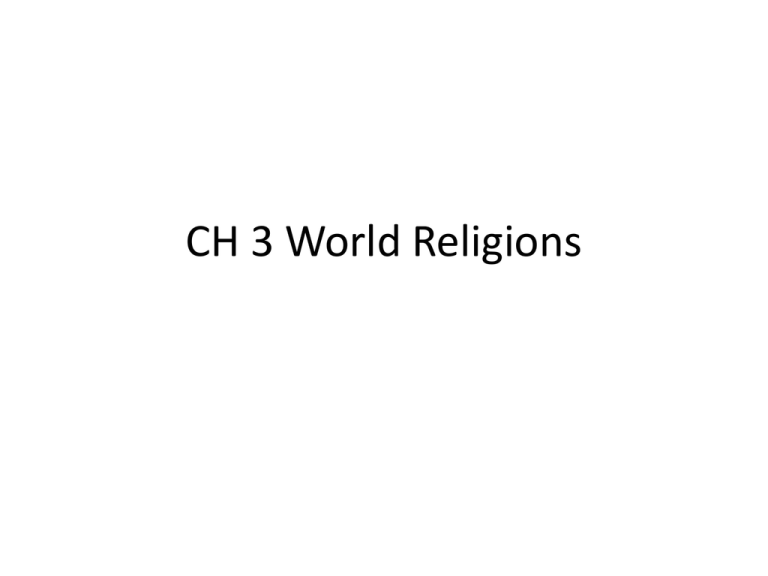
CH 3 World Religions Bell Ringer • What are the three monotheistic religions? • What is the difference between Judaism and Christianity? • Where is Christianity the most common religion? Bell Ringer • Who founded Buddhism? • What is the eightfold path? • Can you name any one of the principles of the eightfold path? • Judaism • Hinduism • Christianity • Buddhism • Islam • Confucianism Spread of World Religions Video http://www.youtube.com/watch?v=DlPllBDRZ2U 3 Major Monotheistic Religions • Monotheism is the belief in a single, all powerful God. • Judaism, Christianity, and Islam all believe in one god. • In fact they all technically believe in the SAME God. – Abraham: Father of Monotheism Judaism • Most historians agree that Abraham probably was a real person (2000 BCE, Mesopotamia) • Abraham was said to have entered into a covenant with God. – Covenant: a sacred agreement • The descendants of Abraham agreed to follow the teachings of this One True God, and they became known as the Israelites, Hebrews, or Jewish people. • Judaism follows the Torah (sacred text). • The Torah contains five books – Genesis – Exodus – Leviticus – Numbers – Deuteronomy • These five books are also the first five books of the Christian Bible. They would also be considered as holy text by followers of Islam. Brief Jewish History • Abraham and his followers would move to the land of Canaan (Modern day Israel). • The Israelites would be enslaved in Egypt by the Pharaohs, but be freed by Moses. • Again they would settle Israel, but eventually be conquered and begin the Jewish Diaspora (Period of time when Jews had no official homeland) • This will end with the creation of Israel in 1947 Beliefs • Judaism had one True god (Yahweh). NOT POLYTHESTIC. • Holy day of the week is called the Sabbath. • Follow the ten commandments (where Christians got them from) • Jewish holidays will start/end at sun down of respective days. Christianity • Second Major Monotheistic religion to be born out of the Middle East. • The first Christians were Jews, followed Jewish Laws, and held Jewish beliefs. • Jesus was Jewish, and generally agreed to have existed according to historians. • Only AFTER the death of Jesus the Religion of Christianity even begin to exist. • Jesus was born in Bethlehem, a territory ruled by the Romans • Jesus taught that God was actually merciful, and not vengeful as portrayed in Jewish texts. Started teaching around 20 CE. • He had a number of followers who were known as apostles. • Jesus was seen as a trouble maker by the Romans, and was executed (most likely) for suspicion of starting an insurrection. • Christians believe that Jesus rose from the dead, the Resurrection. Beliefs • Believe in one true God (God). • Christian holy book is called the Bible (Old Testament = Jewish, New Testament = Christian) • Complex ideas: Trinity (Father, Son, Holy Spirit) • Belief in resurrection and salvation of its believers. • Held many beliefs in common with Judaism, but major differences. (Able to eat shell fish and split hooved animals) Islam • Last of the monotheistic religions from the Middle east. • Taught by Muhammad, who was born in Mecca around 570 CE. • Muhammad came to know of the one true God when the Angel Gabriel told him of it. • Muhammad started to preach of his teachings in Mecca. • Islam means “to submit,” meaning those who “submit to God’s will.” (Muslims) • Muhammad was seen as a threat to local leaders and was driven out of Mecca to the nearby village of Medina. • After time the Muslims were strong enough, captured Mecca, destroyed the Ka’bah (place of idol worship), and reformed it into a holy shrine of Islam. Beliefs • Believe in one true God (Allah). • Holy Scripture is called the Qu’ran (Koran) • Muslims also follow the Sunnah, or teachings and lessons of Muhammad. • Muslims believe it would be idolatry to worship an image of Muhammad or Allah so they use stylized script. 5 Pillars of Islam 1. Profession of Faith – “There is no God but Allah and Muhammad is his prophet.” 2. Daily Prayer – Muslims are to pray 5 times a day facing Mecca 3. Charity – Muslims are to give 2.5% of their surplus wealth to charity every year. 4. Fasting – During Ramadan Muslims are to abstain from eating or drinking from sun up to sun down for the MONTH. 5. Pilgrimage to Mecca (Hajj) – Every Muslim in their life time is encouraged to travel to Mecca to pray at the Ka’bah with fellow believers. This is not required, but strongly encouraged for Muslims. Hinduism • Started in roughly the 2000s BCE and has no clear founder • The religion draws heavily on the influences of the people of India • It is an extremely complex religion with many gods existing. • A nomadic people from the Indus, called the Aryans, are important to Hinduism • The roots of Hinduism are traced to the Vedas (which is comparable to the holy text) • It is believed that the Aryans brought the Vedas to India. • The Vedas – Are a way to sing and praise the gods – Explain elaborate rituals to keep the universe in balance – The Priest who carry out these rituals are extremely important to Hinduism Beliefs • The Vedas call for a Caste system (4 levels) – Brahmins: Top Level/Priests – Kshatriyas (Kasha-tree-uhs): Rulers & Warriors – Vaishyas (Viesh-yuhs): Herders & Merchants – Shudras: servants, farmers, and laborers • Hinduism is polytheistic. • Some people worship one single god, some people worship multiple gods. • Hindus believe that life repeats itself: birth, life, death. (Reincarnation) – Dharma: duty or obligation to live a honorable life – Karma: good and evil done in the past life determines the nature of that person’s next life – If you’re good enough a Hindu can free himself from the Karma moksha, rebirth, and unite with Brahman Buddhism • Arose from the teachings of Siddhartha Gautama (The Buddha) • The story goes: Siddhartha was born a prince in a wealthy family. He left his home to see pain and suffering. He shortly after left his comfortable life to find a greater truth. • He determined that the path to enlightenment was not through excess or minimum, but a “Middle Path” • Through meditation Sid was said to reach nirvana (a state of happiness & peace) & became the Buddha. • He soon began to spread his teachings. Noble Truths • 1st Noble Truth: Suffering is present in all things, and nothing lasts forever.” • 2nd Noble Truth: The cause for suffering is desire.” • 3rd Noble Truth: Removing desire removes suffering.” • 4th Noble Truth: The way to remove desire is to follow the Eightfold Path.” (guidelines to enlightenment) Eightfold Path Spread of Buddhism • Spread by Missionaries and Traders. • While Hinduism is dominant in India, Buddhism is dominant in Southeast Asia, Central Asia, China, Korea, and Japan Confucianism • Not so much a religion, but more a philosophy. • Founded by Confucius • Originally from China Beliefs • As a young man China was in chaos because the rulers had lost control. • People viewed this as losing the Mandate of Heaven (the heavenly support to rule) • Confucius believed that studying tradition and order would help to restore the Mandate. • His main goal was to influence the government to be better. • While he was a failure during his life he has been hugely important to Chinese culture. Beliefs • Building a better more harmonious society would bring humans closer to heaven. • People should be ethical, improve relationships, and respect others. • Parents and rulers should set good examples. • Urges respect for everyone regardless of class or role in society. • Called for Universal Education. 5 Relationships 1. 2. 3. 4. 5. Parent/Child Husband/Wife Older sibling/Younger Sibling Friend/Friend Ruler/Subject • Filial Piety: Children's respect for parents, was HUGELY important to social order.
